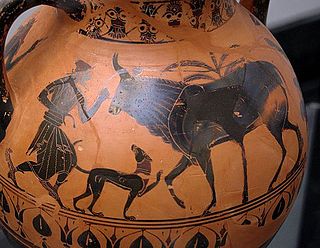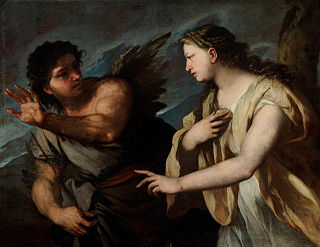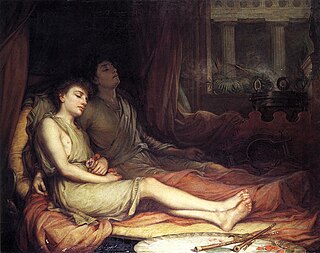
Publius Ovidius Naso, known as Ovid in the English-speaking world, was a Roman poet who lived during the reign of Augustus.

In Greek mythology, Echo was an Oread who resided on Mount Cithaeron. Zeus loved consorting with beautiful nymphs and often visited them on Earth. Eventually, Zeus's wife, Hera, became suspicious, and came from Mount Olympus in an attempt to catch Zeus with the nymphs. Echo, by trying to protect Zeus, endured Hera's wrath, and Hera made her only able to speak the last words spoken to her. So when Echo met Narcissus and fell in love with him, she was unable to tell him how she felt and was forced to watch him as he fell in love with himself.

Arachne is the protagonist of a tale in Roman mythology known primarily from the version told by the Roman poet Ovid (43 BCE–17 CE), which is the earliest extant source for the story. In Book Six of his epic poem Metamorphoses, Ovid recounts how the talented mortal Arachne, daughter of Idmon, challenged Athena, goddess of wisdom and crafts, to a weaving contest. When Athena could find no flaws in the tapestry Arachne had woven for the contest, the goddess became enraged and beat the girl with her shuttle. After Arachne hanged herself out of shame, she was transformed into a spider. The myth both provides an aetiology of spiders' web-spinning abilities and is a cautionary tale warning mortals not to place themselves on an equal level with the gods.

Io was, in Greek mythology, one of the mortal lovers of Zeus. An Argive princess, she was an ancestor of many kings and heroes such as Perseus, Cadmus, Heracles, Minos, Lynceus, Cepheus, and Danaus. The astronomer Simon Marius named a moon of Jupiter after Io in 1614.

In Greek mythology, Alcyone or Halcyone and Ceyx were a wife and husband who incurred the wrath of the god Zeus.

In Greek mythology, Procris was the third daughter of Erechtheus, king of Athens and his wife, Praxithea. She married Cephalus, the son of Deioneus. Procris' sisters were Protogeneia, Pandora, Creusa, Oreithyia and Chthonia. Sophocles wrote a tragedy called Procris which has been lost, as has a version contained in the Greek Cycle, but at least six different accounts of her story still exist.

Myrrha, also known as Smyrna, is the mother of Adonis in Greek mythology. She was transformed into a myrrh tree after having had intercourse with her father, and gave birth to Adonis in tree form. Although the tale of Adonis has Semitic roots, it is uncertain from where the myth of Myrrha emerged, though it was likely from Cyprus.

Picus was a figure in Roman mythology, the first king of Latium. He was the son of Saturn, also known as Stercutus. He was the founder of the first Latin tribe and settlement, Laurentum, located a few miles to the Southeast of the site of the later city of Rome. He was known for his skill at augury and horsemanship. According to Festus he got his name as a consequence of the fact that he used to rely on a woodpecker for the purpose of divination. Picus was also described to be quite handsome, sought after by nymphs and naiads. The witch Circe attempted to seduce him with her charms and herbs while he was on a hunting trip, but he savagely rejected her. She turned him into a woodpecker for scorning her love. When his comrades accused Circe of her crime and demanded Picus' release, she turned them too into a variety of beasts. Picus' wife was Canens, a nymph. After Picus' transformation she wandered madly through the forest for 6 days until finally she lay down on the bank of the Tiber and died. They had one son, Faunus.
In Greek mythology and history, there were at least eight men named Medon.

In Greek mythology, Salmacis was an atypical naiad who rejected the ways of the virginal Greek goddess Artemis in favor of vanity and idleness.

Philomela or Philomel is a minor figure in Greek mythology and is frequently invoked as a direct and figurative symbol in literary, artistic, and musical works in the Western canon.

The Metamorphoses is an 8 AD Latin narrative poem by the Roman poet Ovid, considered his magnum opus. Comprising 11,995 lines, 15 books and over 250 myths, the poem chronicles the history of the world from its creation to the deification of Julius Caesar within a loose mythico-historical framework.

In Greek mythology, Hippomenes, also known as Melanion, was a son of the Arcadian Amphidamas or of Megareus of Onchestus and the husband of Atalanta. He was known to have been one of the disciples of Chiron, and to have surpassed other disciples in his eagerness to undertake hard challenges. Inscriptions mention him as one of the Calydonian hunters.

In Roman mythology, Somnus ("sleep") is the personification of sleep. His Greek counterpart is Hypnos. Somnus resided in the underworld. According to Virgil, Somnus was the brother of Death (Mors), and according to Ovid, Somnus had a 'thousand' sons, the Somnia, who appear in dreams 'mimicking many forms'. Ovid named three of the sons of Somnus: Morpheus, who appears in human guise, Icelos / Phobetor, who appears as beasts, and Phantasos, who appears as inanimate objects.

Morpheus is a god associated with sleep and dreams. In Ovid's Metamorphoses he is the son of Sleep, and he appears in dreams in human form. From the medieval period, the name began to stand more generally for the god of dreams, or of sleep.

Echo and Narcissus is a myth from Ovid's Metamorphoses, a Roman mythological epic from the Augustan Age. The introduction of the myth of the mountain nymph Echo into the story of Narcissus, the beautiful youth who rejected Echo and fell in love with his own reflection, appears to have been Ovid's invention. Ovid's version influenced the presentation of the myth in later Western art and literature.

Metamorphoses is a play by the American playwright and director Mary Zimmerman, adapted from the classic Ovid poem Metamorphoses. The play premiered in 1996 as Six Myths at Northwestern University and later the Lookingglass Theatre Company in Chicago. The play opened off-Broadway in October 2001 at the Second Stage Theatre. It transferred to Broadway on 21 February 2002 at the Circle in the Square Theatre produced by Roy Gabay and Robyn Goodman. That year it won several Tony Awards.

In Greek and Roman mythology, Aura is a minor deity, whose name means "breeze". The plural form, Aurae is sometimes found. According to Nonnus, Aura was the daughter of the Titan Lelantos and the mother, by Dionysus, of Iacchus, a minor deity connected with the Eleusinian mysteries, while Quintus Smyrnaeus makes the Aurae daughters of Boreas, the North-wind. Aurae was the title of a play by the Athenian comic poet Metagenes, who was contemporary with Aristophanes, Phrynichus, and Plato.
Venilia is a Roman deity associated with the winds and the sea. According to Virgil and Ovid, she was a nymph, the sister of Amata and the wife of Janus, with whom she had three children: Turnus, Juturna, and Canens.

In Roman mythology, Iphis or Iphys was a daughter of Telethusa and Ligdus in Crete, who was later transformed, by the goddess Isis, into a boy.

















